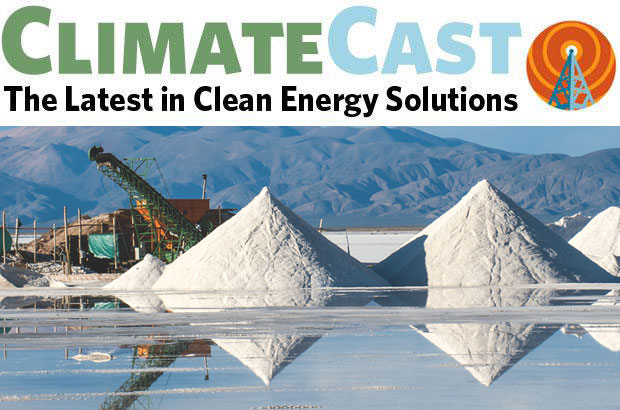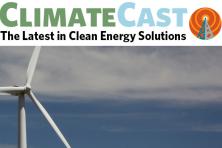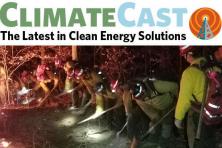Lithium mining and its many costs
The demand for lithium in the clean energy transition cannot be understated; the metal is a key ingredient in the high-capacity batteries needed for electric vehicles, home and grid energy storage, and other renewable energy applications. Yet sourcing this material comes with many challenges and compromises. This need has U.S. car makers scouring mining sites around the world, from Nevada to Chile, to procure this all-important element. Efforts to secure domestic lithium have resulted in fast-tracked permitting processes for mines, which are giving some environmentalists and representatives of Native communities less of a voice in the development process, increasing tensions between these groups and some clean energy advocates. A proposed pit mine at Thacker Pass (on the Nevada-Oregon border) was just approved by the US Court of Appeals for the Ninth Circuit after two years of litigation brought by a coalition of environmentalists and Tribal governments. This mine is expected to become the largest source of lithium in the U.S. The roughly nine-square-mile site is located on land sacred to the Paiute and Shoshone peoples. An alternative lithium mine site that isn’t on Tribal land has been proposed in Maine, but residents and the state government are strongly opposed to any mine development. A third large lithium deposit has been confirmed in Arkansas, leading to a massive land grab by mining companies. A fourth deposit—the Railroad Valley in Nevada—has been declared off-limits for mining, so that NASA can continue using the salt flat to calibrate their research satellites.
Chile sits atop the world’s largest known lithium reserves, and the South American nation is currently the second-largest exporter of the metal after Australia. Mine developers, automakers, and clean energy entrepreneurs are keen to gain access to the country's lithium largesse, but Chilean President Gabriel Boric has been pushing for stronger nationalization of the industry. President Boric still wishes to engage with international mining companies, but the state owns the majority of the shares in the particular mining operation, ensuring the bulk of the profits return to the Chilean government. While this approach may help secure Chile’s economic prospects in the clean energy transition, it’s no guarantee that prosperity and other benefits will reach marginalized indigenous groups and peoples. In neighboring Argentina, massive protests were led by indigenous people against lithium mining in their land.
Governor Inslee wants to curb gas price-gouging
Healthcare workers, first responders and climate advocates are among those criticizing fossil fuel companies for jacking up consumer gasoline prices while padding their profit margins, lying about the true impacts of carbon pollution, and lobbying against climate protection laws.
Late last month, Washington Governor Jay Inslee and state legislators amplified those criticisms, announcing plans to introduce legislation requiring oil companies to be more transparent about their finances, and penalizing companies found guilty of price-gouging. Inslee said “we intend to rein in the terrible pollution that the oil and gas industry is causing across our state and our nation, and we won’t stand for it.” The Governor took issue with what he described as disingenuous and hypocritical claims from fossil fuel industry representatives and their allies blaming high gas prices on the state’s carbon reduction policies rather than on other, tangibly evident factors including the companies’ rapacious focus on profits. Earlier this year, California passed the nation’s first law limiting oil companies’ economic secrecy and penalizing gas price-gouging; Washington could be the second.
Clean energy developments in the Northwest
A new industrial facility in Moses Lake, WA plans to be the first in the nation to produce sustainable jet fuel on a commercial scale. The startup company Twelve says that its fuel, produced by combining plentiful carbon dioxide and hydrogen in a chemical reactor, will produce only one-tenth the emissions of conventional kerosene-based jet fuel. Other Washington-based companies are developing other technologies to slash aviation emissions, including hydrogen-based fuels and battery-powered airplanes.
One of the most notorious nuclear weapons production sites may soon be the location for the country’s largest solar array, according to a recent announcement by the US Department of Energy. The Hanford Site in Eastern Washington (whose role in the Manhattan Project garnered a fleeting mention in the recent film Oppenheimer) is one of several federally owned sites under consideration for new utility-scale clean energy projects.
In a boost for clean energy advocates, a federal court in Eastern Washington rebuffed gas industry efforts to overturn new state building code provisions that require heat pumps in new residential and commercial buildings. A new Sightline report argues that rather than using their ratepayers’ money to lobby and litigate against climate protection policies, gas companies should change their business model—setting aside fossil fuels that are headed for obsolescence, and instead pursue enterprises that advance the clean energy transition. Another recent Sightline piece details the Northwest region’s particular obstacles to building new electricity transmission capacity—an essential priority for accelerating the clean energy transition.
🎧 What we’re listening to
The Yale Climate Connections podcast provides a daily dose of climate news in snackable two-minute intervals, with a special focus on solutions and resilience. Their July 31st episode focused on the negative health impacts of diesel-powered freight vehicles and the efforts of a Tallahassee, FL-based advocacy group to hasten the adoption of zero-emission heavy-duty trucks in their community.





